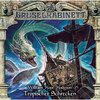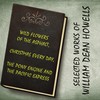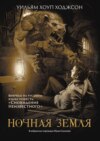Buch lesen: «The Ghost Pirates»
"Strange as the glimmer of the ghastly light That shines from some vast crest of wave at night."
To Mary Whalley
"Olden memories that shine against death's night—
Quiet stars of sweet enchantments,
That are seen In Life's lost distances…"
The World of Dreams
Author's Preface
This book forms the last of three. The first published was "The Boats of the 'Glen Carrig'"; the second, "The House on the Borderland"; this, the third, completes what, perhaps, may be termed a trilogy; for, though very different in scope, each of the three books deals with certain conceptions that have an elemental kinship. With this book, the author believes that he closes the door, so far as he is concerned, on a particular phase of constructive thought.
The Hell O! O! Chaunty
Chaunty Man . . Man the capstan, bullies!
Men . . . . . . Ha!-o-o! Ha!-o-o!
Chaunty Man . . Capstan-bars, you tarry souls!
Men . . . . . . Ha!-o-o! Ha!-o-o!
Chaunty Man . . Take a turn!
Men . . . . . . Ha!-o-o!
Chaunty Man . . Stand by to fleet!
Men . . . . . . Ha!-o-o!
Chaunty Man . . Stand by to surge!
Men . . . . . . Ha!-o-o!
Chaunty Man . . Ha!—o-o-o-o!
Men . . . . . . TRAMP!
And away we go!
Chaunty Man . . Hark to the tramp of the
bearded shellbacks!
Men . . . . . . Hush!
O hear 'em tramp!
Chaunty Man . . Tramping, stamping—
treading, vamping,
While the cable
comes in ramping.
Men . . . . . . Hark!
O hear 'em stamp!
Chaunty Man . . Surge when it rides!
Surge when it rides!
Round-o-o-o
handsome as it slacks!
Men . . . . . . Ha!-o-o-o-o!
hear 'em ramp!
Ha!-oo-o-o!
hear 'em stamp!
Ha!-o-o-o-o-oo!
Ha!-o-o-o-o-o-o!
Chorus . . . . They're shouting now; oh! hear 'em
A-bellow as they stamp:—
Ha!-o-o-o! Ha!-o-o-o!
Ha!-o-o-o!
A-shouting as they tramp!
Chaunty Man . . O hark to the haunting chorus
of the capstan and the bars!
Chaunty-o-o-o
and rattle crash—
Bash against the stars!
Men . . . . . . Ha-a!-o-o-o!
Tramp and go!
Ha-a!-o-o-o!
Ha-a!-o-o-o!
Chaunty Man . . Hear the pawls a-ranting: with
the bearded men a-chaunting;
While the brazen dome above 'em
Bellows back the 'bars.'
Men . . . . . . Hear and hark!
O hear 'em!
Ha-a!-o-o!
Ha-a!-o-o!
Chaunty Man . . Hurling songs towards the
heavens—!
Men . . . . . . Ha-a!-o-o!
Ha-a!-o-o!
Chaunty Man . . Hush! O hear 'em!
Hark! O hear 'em!
Hurling oaths among their spars!
Men . . . . . . Hark! O hear 'em!
Hush! O hear 'em!
Chaunty Man . . Tramping round between the
bars!
Chorus . . . . They're shouting now; oh! hear
A-bellow as they stamp:—
Ha-a!-o-o-o! Ha-a!-o-o-o!
Ha-a!-o-o-o!
A-shouting as they tramp!
Chaunty Man . . O do you hear the
capstan-chaunty!
Thunder round the pawls!
Men . . . . . . Click a-clack,
a-clatter
Surge!
And scatter bawls!
Chaunty Man . . Click-a-clack, my bonny boys,
while it comes in handsome!
Men . . . . . . Ha-a!-o-o!
Hear 'em clack!
Chaunty Man . . Ha-a!-o-o! Click-a-clack!
Men . . . . . . Hush! O hear 'em pant!
Hark! O hear 'em rant!
Chaunty Man . . Click, a-clitter, clicker-clack.
Men . . . . . . Ha-a!-o-o!
Tramp and go!
Chaunty Man . . Surge! And keep away the slack!
Men . . . . . . Ha-a!-o-o!
Away the slack:
Ha-a!-o-o!
Click-a-clack
Chaunty Man . . Bustle now each jolly Jack.
Surging easy! Surging e-a-s-y!!
Men . . . . . . Ha-a!-o-o!
Surging easy
Chaunty Man . . Click-a-clatter—
Surge; and steady!
Man the stopper there!
All ready?
Men . . . . . . Ha-a!-o-o!
Ha-a!-o-o!
Chaunty Man . . Click-a-clack, my bouncing boys:
Men . . . . . . Ha-a!-o-o!
Tramp and go!
Chaunty Man . . Lift the pawls, and come back
easy.
Men . . . . . . Ha-a!-o-o!
Steady-o-o-o-o!
Chaunty Man . . Vast the chaunty!
Vast the capstan!
Drop the pawls! Be-l-a-y!
Chorus . . . . Ha-a!-o-o! Unship the bars!
Ha-a!-o-o! Tramp and go!
Ha-a!-o-o! Shoulder bars!
Ha-a!-o-o! And away we blow!
Ha-a!-o-o-o!
Ha-a!-o-o-o-o!
Ha-a!-o-o-o-o-o!
I
The Figure Out of the Sea
He began without any circumlocution.
I joined the Mortzestus in 'Frisco. I heard before I signed on, that there were some funny yarns floating round about her; but I was pretty nearly on the beach, and too jolly anxious to get away, to worry about trifles. Besides, by all accounts, she was right enough so far as grub and treatment went. When I asked fellows to give it a name, they generally could not. All they could tell me, was that she was unlucky, and made thundering long passages, and had no more than a fair share of dirty weather. Also, that she had twice had the sticks blown out of her, and her cargo shifted. Besides all these, a heap of other things that might happen to any packet, and would not be comfortable to run into. Still, they were the ordinary things, and I was willing enough to risk them, to get home. All the same, if I had been given the chance, I should have shipped in some other vessel as a matter of preference.
When I took my bag down, I found that they had signed on the rest of the crowd. You see, the "home lot" cleared out when they got into 'Frisco, that is, all except one young fellow, a cockney, who had stuck by the ship in port. He told me afterwards, when I got to know him, that he intended to draw a pay-day out of her, whether any one else did, or not.
The first night I was in her, I found that it was common talk among the other fellows, that there was something queer about the ship. They spoke of her as if it were an accepted fact that she was haunted; yet they all treated the matter as a joke; all, that is, except the young cockney— Williams—who, instead of laughing at their jests on the subject, seemed to take the whole matter seriously.
This made me rather curious. I began to wonder whether there was, after all, some truth underlying the vague stories I had heard; and I took the first opportunity to ask him whether he had any reasons for believing that there was anything in the yarns about the ship.
At first he was inclined to be a bit offish; but, presently, he came round, and told me that he did not know of any particular incident which could be called unusual in the sense in which I meant. Yet that, at the same time, there were lots of little things which, if you put them together, made you think a bit. For instance, she always made such long passages and had so much dirty weather—nothing but that and calms and head winds. Then, other things happened; sails that he knew, himself, had been properly stowed, were always blowing adrift at night. And then he said a thing that surprised me.
"There's too many bloomin' shadders about this 'ere packet; they gets onter yer nerves like nothin' as ever I seen before in me nat'ral."
He blurted it all out in a heap, and I turned round and looked at him.
"Too many shadows!" I said. "What on earth do you mean?" But he refused to explain himself or tell me anything further—just shook his head, stupidly, when I questioned him. He seemed to have taken a sudden, sulky fit. I felt certain that he was acting dense, purposely. I believe the truth of the matter is that he was, in a way, ashamed of having let himself go like he had, in speaking out his thoughts about "shadders." That type of man may think things at times; but he doesn't often put them into words. Anyhow, I saw it was no use asking any further questions; so I let the matter drop there. Yet, for several days afterwards, I caught myself wondering, at times, what the fellow had meant by "shadders."
We left 'Frisco next day, with a fine, fair wind, that seemed a bit like putting the stopper on the yarns I had heard about the ship's ill luck. And yet—
He hesitated a moment, and then went on again.
For the first couple of weeks out, nothing unusual happened, and the wind still held fair. I began to feel that I had been rather lucky, after all, in the packet into which I had been shunted. Most of the other fellows gave her a good name, and there was a pretty general opinion growing among the crowd, that it was all a silly yarn about her being haunted. And then, just when I was settling down to things, something happened that opened my eyes no end.
It was in the eight to twelve watch, and I was sitting on the steps, on the starboard side, leading up to the fo'cas'le head. The night was fine and there was a splendid moon. Away aft, I heard the timekeeper strike four bells, and the look-out, an old fellow named Jaskett, answered him. As he let go the bell lanyard, he caught sight of me, where I sat quietly, smoking. He leant over the rail, and looked down at me.
"That you, Jessop?" he asked.
"I believe it is," I replied.
"We'd 'ave our gran'mothers an' all the rest of our petticoated relash'ns comin' to sea, if 'twere always like this," he remarked, reflectively—indicating, with a sweep of his pipe and hand, the calmness of the sea and sky.
I saw no reason for denying that, and he continued:
"If this ole packet is 'aunted, as some on 'em seems to think, well all as I can say is, let me 'ave the luck to tumble across another of the same sort. Good grub, an' duff fer Sundays, an' a decent crowd of 'em aft, an' everythin' comfertable like, so as yer can feel yer knows where yer are. As fer 'er bein' 'aunted, that's all 'ellish nonsense. I've comed 'cross lots of 'em before as was said to be 'aunted, an' so some on 'em was; but 'twasn't with ghostesses. One packet I was in, they was that bad yer couldn't sleep a wink in yer watch below, until yer'd 'ad every stitch out yer bunk an' 'ad a reg'lar 'unt. Sometimes—" At that moment, the relief, one of the ordinary seamen, went up the other ladder on to the fo'cas'le head, and the old chap turned to ask him "Why the 'ell" he'd not relieved him a bit smarter. The ordinary made some reply; but what it was, I did not catch; for, abruptly, away aft, my rather sleepy gaze had lighted on something altogether extraordinary and outrageous. It was nothing less than the form of a man stepping inboard over the starboard rail, a little abaft the main rigging. I stood up, and caught at the handrail, and stared.
Behind me, someone spoke. It was the look-out, who had come down off the fo'cas'le head, on his way aft to report the name of his relief to the second mate.
"What is it, mate?" he asked, curiously, seeing my intent attitude.
The thing, whatever it was, had disappeared into the shadows on the lee side of the deck.
"Nothing!" I replied, shortly; for I was too bewildered then, at what my eyes had just shown me, to say any more. I wanted to think.
The old shellback glanced at me; but only muttered something, and went on his way aft.
For a minute, perhaps, I stood there, watching; but could see nothing. Then I walked slowly aft, as far as the after end of the deck house. From there, I could see most of the main deck; but nothing showed, except, of course, the moving shadows of the ropes and spars and sails, as they swung to and fro in the moonlight.
The old chap who had just come off the look-out, had returned forrard again, and I was alone on that part of the deck. And then, all at once, as I stood peering into the shadows to leeward, I remembered what Williams had said about there being too many "shadders." I had been puzzled to understand his real meaning, then. I had no difficulty now. There were too many shadows. Yet, shadows or no shadows, I realised that for my own peace of mind, I must settle, once and for all, whether the thing I had seemed to see stepping aboard out of the ocean, had been a reality, or simply a phantom, as you might say, of my imagination. My reason said it was nothing more than imagination, a rapid dream—I must have dozed; but something deeper than reason told me that this was not so. I put it to the test, and went straight in amongst the shadows— There was nothing.
I grew bolder. My common sense told me I must have fancied it all. I walked over to the mainmast, and looked behind the pinrail that partly surrounded it, and down into the shadow of the pumps; but here again was nothing. Then I went in under the break of the poop. It was darker under there than out on deck. I looked up both sides of the deck, and saw that they were bare of anything such as I looked for. The assurance was comforting. I glanced at the poop ladders, and remembered that nothing could have gone up there, without the Second Mate or the Time-keeper seeing it. Then I leant my back up against the bulkshead, and thought the whole matter over, rapidly, sucking at my pipe, and keeping my glance about the deck. I concluded my think, and said "No!" out loud. Then something occurred to me, and I said "Unless—" and went over to the starboard bulwarks, and looked over and down into the sea; but there was nothing but sea; and so I turned and made my way forrard. My common sense had triumphed, and I was convinced that my imagination had been playing tricks with me.
I reached the door on the portside, leading into the fo'cas'le, and was about to enter, when something made me look behind. As I did so, I had a shaker. Away aft, a dim, shadowy form stood in the wake of a swaying belt of moonlight, that swept the deck a bit abaft the main-mast.
It was the same figure that I had just been attributing to my fancy. I will admit that I felt more than startled; I was quite a bit frightened. I was convinced now that it was no mere imaginary thing. It was a human figure. And yet, with the flicker of the moonlight and the shadows chasing over it, I was unable to say more than that. Then, as I stood there, irresolute and funky, I got the thought that someone was acting the goat; though for what reason or purpose, I never stopped to consider. I was glad of any suggestion that my common sense assured me was not impossible; and, for the moment, I felt quite relieved. That side to the question had not presented itself to me before. I began to pluck up courage. I accused myself of getting fanciful; otherwise I should have tumbled to it earlier. And then, funnily enough, in spite of all my reasoning, I was still afraid of going aft to discover who that was, standing on the lee side of the maindeck. Yet I felt that if I shirked it, I was only fit to be dumped overboard; and so I went, though not with any great speed, as you can imagine.
I had gone half the distance, and still the figure remained there, motionless and silent—the moonlight and the shadows playing over it with each roll of the ship. I think I tried to be surprised. If it were one of the fellows playing the fool, he must have heard me coming, and why didn't he scoot while he had the chance? And where could he have hidden himself, before? All these things, I asked myself, in a rush, with a queer mixture of doubt and belief; and, you know, in the meantime, I was drawing nearer. I had passed the house, and was not twelve paces distant; when, abruptly, the silent figure made three quick strides to the port rail, and climbed over it into the sea.
I rushed to the side, and stared over; but nothing met my gaze, except the shadow of the ship, sweeping over the moonlit sea.
How long I stared down blankly into the water, it would be impossible to say; certainly for a good minute. I felt blank—just horribly blank. It was such a beastly confirmation of the unnaturalness of the thing I had concluded to be only a sort of brain fancy. I seemed, for that little time, deprived, you know, of the power of coherent thought. I suppose I was dazed—mentally stunned, in a way.
As I have said, a minute or so must have gone, while I had been staring into the dark of the water under the ship's side. Then, I came suddenly to my ordinary self. The Second Mate was singing out: "Lee fore brace."
I went to the braces, like a chap in a dream.
II
What Tammy the 'Prentice Saw
The next morning, in my watch below, I had a look at the places where that strange thing had come aboard, and left the ship; but I found nothing unusual, and no clue to help me to understand the mystery of the strange man.
For several days after that, all went quietly; though I prowled about the decks at night, trying to discover anything fresh that might tend to throw some light on the matter. I was careful to say nothing to any one about the thing I had seen. In any case, I felt sure I should only have been laughed at.
Several nights passed away in this manner, and I was no nearer to an understanding of the affair. And then, in the middle watch, something happened.
It was my wheel. Tammy, one of the first voyage 'prentices, was keeping time—walking up and down the lee side of the poop. The Second Mate was forrard, leaning over the break of the poop, smoking. The weather still continued fine, and the moon, though declining, was sufficiently powerful to make every detail about the poop, stand out distinctly. Three bells had gone, and I'll admit I was feeling sleepy. Indeed, I believe I must have dozed, for the old packet steered very easily, and there was precious little to do, beyond giving her an odd spoke now and again. And then, all at once, it seemed to me that I heard someone calling my name, softly. I could not be certain; and first I glanced forrard to where the Second stood, smoking, and from him, I looked into the binnacle. The ship's head was right on her course, and I felt easier. Then, suddenly, I heard it again. There was no doubt about it this time, and I glanced to leeward. There I saw Tammy reaching over the steering gear, his hand out, in the act of trying to touch my arm. I was about to ask him what the devil he wanted, when he held up his finger for silence, and pointed forrard along the lee side of the poop. In the dim light, his face showed palely, and he seemed much agitated. For a few seconds, I stared in the direction he indicated, but could see nothing.
"What is it?" I asked in an undertone, after a couple of moments' further ineffectual peering. "I can't see anything."
"H'sh!" he muttered, hoarsely, without looking in my direction. Then, all at once, with a quick little gasp, he sprang across the wheel-box, and stood beside me, trembling. His gaze appeared to follow the movements of something I could not see.
I must say that I was startled. His movement had shown such terror; and the way he stared to leeward made me think he saw something uncanny.
"What the deuce is up with you?" I asked, sharply. And then I remembered the Second Mate. I glanced forrard to where he lounged. His back was still towards us, and he had not seen Tammy. Then I turned to the boy.
"For goodness sake, get to looard before the Second sees you!" I said. "If you want to say anything, say it across the wheel-box. You've been dreaming."
Even as I spoke, the little beggar caught at my sleeve with one hand; and, pointing across to the log-reel with the other, screamed: "He's coming! He's coming–" At this instant, the Second Mate came running aft, singing out to know what was the matter. Then, suddenly, crouching under the rail near the log-reel, I saw something that looked like a man; but so hazy and unreal, that I could scarcely say I saw anything. Yet, like a flash, my thoughts ripped back to the silent figure I had seen in the flicker of the moonlight, a week earlier.
The Second Mate reached me, and I pointed, dumbly; and yet, as I did so, it was with the knowledge that he would not be able to see what I saw. (Queer, wasn't it?) And then, almost in a breath, I lost sight of the thing, and became aware that Tammy was hugging my knees.
The Second continued to stare at the log-reel for a brief instant; then he turned to me, with a sneer.
"Been asleep, the pair of you, I suppose!" Then, without waiting for my denial, he told Tammy to go to hell out of it and stop his noise, or he'd boot him off the poop.
After that, he walked forward to the break of the poop, and lit his pipe, again—walking forward and aft every few minutes, and eyeing me, at times, I thought, with a strange, half-doubtful, half-puzzled look.
Later, as soon as I was relieved, I hurried down to the 'Prentice's berth. I was anxious to speak to Tammy. There were a dozen questions that worried me, and I was in doubt what I ought to do. I found him crouched on a sea-chest, his knees up to his chin, and his gaze fixed on the doorway, with a frightened stare. I put my head into the berth, and he gave a gasp; then he saw who it was, and his face relaxed something of its strained expression.
He said: "Come in," in a low voice, which he tried to steady; and I stepped over the wash-board, and sat down on a chest, facing him.
"What was it?" he asked; putting his feet down on to the deck, and leaning forward. "For God's sake, tell me what it was!"
His voice had risen, and I put up my hand to warn him.
"H'sh!" I said. "You'll wake the other fellows."
He repeated his question, but in a lower tone. I hesitated, before answering him. I felt, all at once, that it might be better to deny all knowledge—to say I hadn't seen anything unusual. I thought quickly, and made answer on the turn of the moment.
"What was what?" I said. "That's just the thing I've come to ask you. A pretty pair of fools you made of the two of us up on the poop just now, with your hysterical tomfoolery."
I concluded my remark in a tone of anger.
"I didn't!" he answered, in a passionate whisper. "You know I didn't. You know you saw it yourself. You pointed it out to the Second Mate. I saw you."
The little beggar was nearly crying between fear, and vexation at my assumed unbelief.
"Rot!" I replied. "You know jolly well you were sleeping in your time-keeping. You dreamed something and woke up suddenly. You were off your chump."
I was determined to reassure him, if possible; though, goodness! I wanted assurance myself. If he had known of that other thing, I had seen down on the maindeck, what then?
"I wasn't asleep, any more than you were," he said, bitterly. "And you know it. You're just fooling me. The ship's haunted."
"What!" I said, sharply.
"She's haunted," he said, again. "She's haunted."
"Who says so?" I inquired, in a tone of unbelief.
"I do! And you know it. Everybody knows it; but they don't more than half believe it … I didn't, until tonight."
"Damned rot!" I answered. "That's all a blooming old shellback's yarn.
She's no more haunted than I am."
"It's not damned rot," he replied, totally unconvinced. "And it's not an old shellback's yarn … Why won't you say you saw it?" he cried, growing almost tearfully excited, and raising his voice again.
I warned him not to wake the sleepers.
"Why won't you say that you saw it?" he repeated.
I got up from the chest, and went towards the door.
"You're a young idiot!" I said. "And I should advise you not to go gassing about like this, round the decks. Take my tip, and turn-in and get a sleep. You're talking dotty. Tomorrow you'll perhaps feel what an unholy ass you've made of yourself."
I stepped over the washboard, and left him. I believe he followed me to the door to say something further; but I was half-way forward by then.
For the next couple of days, I avoided him as much as possible, taking care never to let him catch me alone. I was determined, if possible, to convince him that he had been mistaken in supposing that he had seen anything that night. Yet, after all, it was little enough use, as you will soon see. For, on the night of the second day, there was a further extraordinary development, that made denial on my part useless.



















